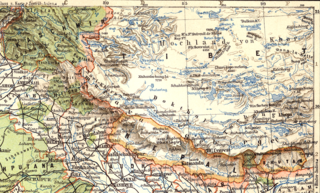Related Research Articles

The Treaty of Peace between the United States of America and the Kingdom of Spain, commonly known as the Treaty of Paris of 1898, was signed by Spain and the United States on December 10, 1898, that ended the Spanish–American War. Under it, Spain relinquished all claim of sovereignty over and title to territories described there as the island of Porto Rico and other islands now under Spanish sovereignty in the West Indies, and the island of Guam in the Marianas or Ladrones, the archipelago known as the Philippine Islands, and comprehending the islands lying within the following line:, to the United States. The cession of the Philippines involved a compensation of $20 million from the United States to Spain.
The Burlingame Treaty, also known as the Burlingame–Seward Treaty of 1868, was a landmark treaty between the United States and Qing China, amending the Treaty of Tientsin, to establish formal friendly relations between the two nations, with the United States granting China the status of most favored nation with regards to trade. It was signed in the capital of the United States, Washington, D.C. in 1868 and ratified in Peking in 1869. The most significant result of the treaty was that it effectively lifted any former restrictions in regards to emigration to the United States from China, with large-scale immigration to the United States beginning in earnest by Chinese immigrants.

The Constitution of the Confederate States was the supreme law of the Confederate States of America. It superseded the Provisional Constitution of the Confederate States, the Confederate State's first constitution, in 1862. It remained in effect until the end of the American Civil War in 1865.
The Treaty of Küçük Kaynarca, formerly often written Kuchuk-Kainarji, was a peace treaty signed on 21 July 1774, in Küçük Kaynarca between the Russian Empire and the Ottoman Empire, ending the Russo-Turkish War of 1768–74 with major concessions to Russia. The concessions to Russia are not merely territorial; not only was the Crimea Khanate ceded, but Russia also gained the right to construct a Greek Orthodox Church in Istanbul, claiming itself to be the protector of the Greek Orthodox in the Ottoman Empire. This was a pretext for frequent and numerous interventions in the decades to follow. Ottoman Christians started to feel more empowered as European and Christian powers demonstrated their rising influence and political power. Access to Europe's political networks, markets and educational institutions created a class privilege for Ottoman Christians, and scholars often regard the treaty as turning point for relations between Ottoman Christians and the European nations.

The Sultanate of Sulu was a Sunni Muslim state that ruled the Sulu Archipelago, coastal areas of Zamboanga City and certain portions of Palawan in the today's Philippines, alongside parts of present-day Sabah and North Kalimantan in north-eastern Borneo.

The Sino-Japanese Peace Treaty, formally the Treaty of Peace between the Republic of China and Japan and commonly known as the Treaty of Taipei, was a peace treaty between Japan and the Republic of China (ROC) signed in Taipei, Taiwan on 28 April 1952, and took effect on August 5 the same year, marking the formal end of the Second Sino-Japanese War (1937–1945).
The Treaty with Tunis was signed on August 28, 1797, between the United States of America and the Barbary State of Tunis. As the treaty provided in Article One:

The Svalbard Treaty recognises the sovereignty of Norway over the Arctic archipelago of Svalbard, at the time called Spitsbergen. The exercise of sovereignty is, however, subject to certain stipulations, and not all Norwegian law applies. The treaty restricts military uses of the archipelago, but it is not demilitarized. The signatories were given equal rights to engage in commercial activities on the islands. As of 2024, Norway and Russia make use of this right.

The 1838 Treaty of Balta Liman, or the Anglo-Ottoman Treaty, is a formal trade agreement signed between the Sublime Porte of the Ottoman Empire and Great Britain. The trade policies imposed upon the Ottoman Empire, after the Treaty of Balta Liman, were some of the most liberal, open market settlements that had ever been enacted during the time. The terms of the treaty stated that the Ottoman Empire will abolish all monopolies, allow British merchants and their collaborators to have full access to all Ottoman markets and will be taxed equally to local merchants. These agreements did not constitute an equal free trade arrangement, as Britain still employed protectionist policies on their agricultural markets.

The Treaty of Wanghia was the first of the unequal treaties imposed by the United States on the Qing dynasty. By the terms of the diplomatic agreement, the United States received the same privileges with China that Great Britain had achieved under the Treaty of Nanking in 1842. The United States received additional privileges as well, including the right to cabotage on preferential terms and the expansion of extraterritoriality. Imperial China's Qing dynasty signed the treaty with the United States on July 3, 1844, in the Kun Iam Temple. The treaty was subsequently passed by the US Congress and ratified by President John Tyler on January 17, 1845. The Treaty of Wanghia was formally in effect until the signing of the 1943 Sino-American Treaty for the Relinquishment of Extraterritorial Rights in China.

The Raj of Sarawak, Kingdom of Sarawak or State of Sarawak, was a kingdom founded in 1841 in northwestern Borneo and was in a treaty of protection with the United Kingdom from 1888. It was formed from a series of land concessions acquired by the Englishman James Brooke from the Sultan of Brunei. Sarawak was recognised as a sovereign state by the United States in 1850, and by the United Kingdom in 1864. Since the formation of Malaysia on 16 September 1963, The Raj has been a constitutent state of Malaysia as the state of Sarawak.

The Lodge Reservations, written by United States Senator Henry Cabot Lodge, the Republican Majority Leader and Chairman of the Committee on Foreign Relations, were fourteen reservations to the Treaty of Versailles and other proposed post-war agreements. The Treaty called for the creation of a League of Nations in which the promise of mutual security would hopefully prevent another major world war; the League charter, primarily written by President Woodrow Wilson, let the League set the terms for war and peace. If the League called for military action, all members would have to join in.
A Treaty of Peace, Amity, Commerce and Navigation, also known as the Shufeldt Treaty, was negotiated between representatives of the United States and Korea in 1882.
The Supremacy Clause of the Constitution of the United States establishes that the Constitution, federal laws made pursuant to it, and treaties made under its authority, constitute the "supreme Law of the Land", and thus take priority over any conflicting state laws. It provides that state courts are bound by, and state constitutions subordinate to, the supreme law. However, federal statutes and treaties must be within the parameters of the Constitution; that is, they must be pursuant to the federal government's enumerated powers, and not violate other constitutional limits on federal power, such as the Bill of Rights—of particular interest is the Tenth Amendment to the United States Constitution, which states that the federal government has only those powers that are delegated to it by the Constitution. It is the responsibility of the United States Supreme Court in that case to exercise the power of judicial review: the ability to invalidate a statute for violating a provision of the Constitution.

The Treaty of Rio de Janeiro is the treaty between the Kingdom of Portugal and the Empire of Brazil, signed August 29, 1825, which recognized Brazil as an independent nation, formally ending the Brazilian war of independence.
The Treaty of Amity and Commerce between His Majesty the Magnificent King of Siam and the United States of America, or Roberts Treaty of 1833, was the first treaty between Siam and the United States. It was also the first treaty that the US had with an Asian nation.

The Nepal–Britain Treaty was first discussed in 1921 and the final treaty was signed on 21 December 1923 in Singha Durbar. The treaty was the first formal acknowledgement by the British that Nepal, as an independent nation, had the right to conduct its foreign policy in any way it saw fit and was considered to be “a great achievement of 25 years of Chandra Shumsher’s diplomacy.” The treaty was recorded in 1925 in the League of Nations.
The Treaty of Friendship, Commerce and Navigation between the United States of America and the Republic of China was a bilateral treaty signed by the United States and China on November 4, 1946. It became effective on November 30, 1948, following the mutual exchange of ratifications, pursuant to Article XXX. It fulfilled the desires of both countries to establish such a treaty as previously expressed in Article XII of the Treaty for Relinquishment of Extraterritorial Rights in China. The US received a large number of economic privileges from this agreement and Chinese businesses complained of unfair competition from US products which dominated the China market. While the treaty contained elements of equal rights, China was in no economic position to exercise its privileges vis-a-vis the vastly more developed US, which have led some scholars to describe the treaty as 'unfavourable' to China or comparing them to the Unequal Treaties.

The Treaty of Labuan was signed between Great Britain and the Brunei Sultanate on 18 December 1846. Under this treaty, the Sultan of Brunei ceded the island of Labuan to Great Britain.
The 1930 Temporary Anglo-Soviet Commercial Agreement was an agreement signed in London on April 16, 1930, to promote trade between the United Kingdom and the Union of Soviet Socialist Republics. It was signed by Foreign Secretary Arthur Henderson and Soviet Plenipotentiary in London Grigory Sokolnikov.
References
- ↑ "Brunei Info | Embassy of the United States Brunei, Darussalam". Archived from the original on 2013-01-27. Retrieved 2013-01-27.
- ↑ "DipNote".
- ↑ "TAC Program - Making Trade Agreements Work for You!".